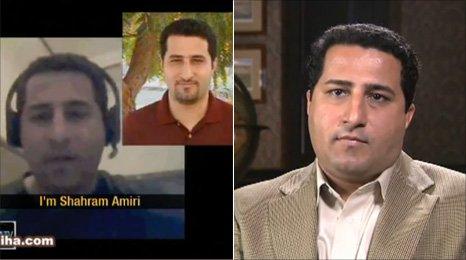Missing Iranian scientist appears at embassy in US
- Published

Conflicting videos have deepened the mystery as to Mr Amiri's whereabouts
A missing Iranian nuclear scientist, who Tehran says was kidnapped a year ago by the CIA, has taken refuge in the Iran section of Pakistan's US embassy.
A spokesman from Pakistan's Foreign Office, Abdul Basit, told the BBC that Shahram Amiri was seeking immediate repatriation to Iran.
In June videos purportedly of Mr Amiri but containing contradictory information on his whereabouts emerged.
The US rejected Tehran's claims that it was behind Mr Amiri's disappearance.
Iranian media say Mr Amiri worked as a researcher at a university in Tehran, but some reports say he worked for the country's atomic energy organisation and had in-depth knowledge of its controversial nuclear programme.
ABC News reported in March that he had defected and was helping the CIA, revealing valuable information about the Iranian nuclear programme.
But earlier this month, Tehran said it had proof he was being held in the US.
The allegation came after three videos purportedly of Mr Amiri emerged - the first said he had been kidnapped, the second that he was living freely in Arizona, and the third that he had escaped from his captors.
Diplomatic standoff
The BBC's former correspondent in Tehran, Jon Leyne, says that Iran's version of the story seems to be backed up by events unfolding in Washington DC.
Our correspondent says Mr Amiri's sudden appearance is a major embarrassment for the American spy agencies and could lead to a diplomatic stand-off.
Iranian Foreign Minister Manouchehr Mottaki has confirmed reports that Mr Amiri had asked to be repatriated to Iran.
"We hope that, without any obstacle, he can return to his country, that they (the United States), do not create any obstacle for his return to his homeland," Mr Mottaki added.
While US authorities cannot enter Iran's diplomatic premises, they could prevent Mr Amiri leaving.
The Iran interest section is under the protection of Pakistan's embassy in Washington, but housed in a different building and run by Iranians.
The US cut diplomatic relations with Iran shortly after the 1979 Islamic Revolution.
Iranian state radio has reported that Mr Amiri said in a telephone interview from inside the Iranian interest section that he had been "under enormous psychological pressure and supervision of armed agents in the past 14 months".
Mr Amiri was also quoted as saying that the US government had wanted to return him quietly to Iran using another country's airline and in doing so "cover up this abduction".
"After my comments were released on the internet, the Americans realised that they were the losers of this game," he was quoted as having said.
Video claims
A US official, who spoke on condition of anonymity, told the Reuters news agency that Mr Amiri had been visiting the US and had decided "to return to Iran of his own free will".
Mr Amiri went missing a year ago while on pilgrimage in Saudi Arabia.
The first two videos, telling starkly contradictory stories, were posted on the video-sharing site YouTube on 8 June.
In the first, initially broadcast by Iranian television, a man purporting to be Mr Amiri says he was kidnapped by the US while on pilgrimage in the Saudi Arabian city of Medina and that he is now living in the US state of Arizona.
At the time the Iranian government described the video as evidence that he was being held in the US against his will.
In the second, posted hours later on YouTube, a similar-looking man claiming to be the scientist says he is happy in the US, living in freedom and safety.
Plea for help
In the third video, which was broadcast by Iranian state TV on 29 June, a man claiming to be the missing scientist says: "I, Shahram Amiri, am a national of the Islamic Republic of Iran and a few minutes ago I succeeded in escaping US security agents in Virginia.
"Presently, I am producing this video in a safe place. I could be rearrested at any time."
The man in the video also dismisses the second recording, in which it was claimed that the scientist was living freely in the US, as "a complete fabrication".
"I am not free here and I am not permitted to contact my family. If something happens and I do not return home alive, the US government will be responsible."
The video finishes with the man urging Iranian officials and human rights organisations to "put pressure on the US government for my release and return".
"I was not prepared to betray my country under any kind of threats or bribery by the US government," he adds.